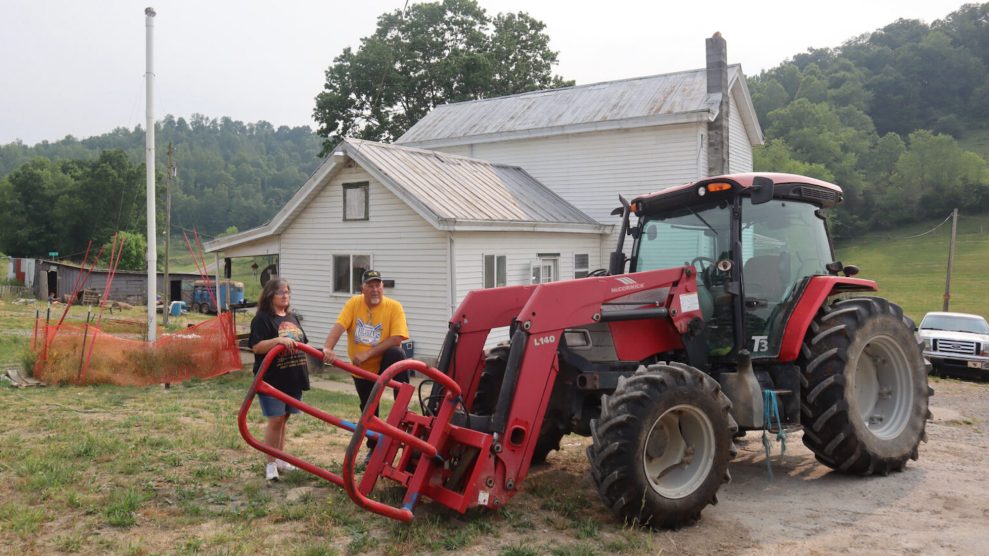Methane From Coal Mining is Plaguing West Virginia Families – Mother Jones

Melissa and Jim Nestor at their farm in Taylor County, Virginia. James Bruggers
This story was originally published by Inside Climate News and is reproduced here as part of the Climate Desk collaboration.
Month-old kittens scamper around, tumbling into one another on the grass. A black-and-white border collie, Maggie, nestles against the side of a farmhouse and nurses a puppy. Beef cattle graze on the hillside behind the house, which has been vacant since last summer—when, without warning, the water well went dry.
At the time, Jim and Melissa Nestor were raising three boys on their farm in a lush green valley three miles south of Thornton, a town along US Highway 50 with a church, a towing service, a post office, and no stoplight.
When the Nestors disconnected the well’s pump to see if that was the problem, they heard a loud sound: “Woooshhhh,” Melissa Nestor recalled, blowing air out of puckered lips.
“It was like, whoa,’’ Nestor said. “Gas was coming up out of the well. It’s a wonder we didn’t have a major catastrophe right there, like an explosion caused by a spark from a power tool.”

Jim and Melissa Nestor.
James Bruggers
From a coal mine about 350 feet below, methane had forced its way up through bedrock fissures and into the shaft of the well.
At that moment last August, the Nestors’ lives—which revolved around caring for their livestock and pets and supporting their three sons’ activities in baseball, wrestling, football and 4-H—were changed forever.
Now the Nestors are living in temporary quarters a mile away while their future hangs in the balance, depending on the outcome of a lawsuit the couple has filed in Taylor County Circuit Court against Arch Resources of St. Louis, the nation’s second-largest coal mine operator.
The Nestors’ case is one of at least eight still pending that contend that Arch’s Leer Mine in Taylor County has damaged homes and property as a result of mining practices that can cause land to sink, alter ground and surface waters and, in the Nestors’ case, release dangerous methane.
The lawsuits argue, among other allegations, that Arch’s mining activities violated state law that directs mining companies to “protect off-site areas from damage,” “eliminate fire hazards” and “minimize the disturbance of the prevailing hydrologic balance at the mine site and in associated off-site areas,” both during and after mining operations.
Those lawsuits follow more than two dozen others filed in Taylor County in recent years in which legal settlements were reached, according to Hunter Mullens, the attorney in Philippi, West Virginia, who is handling all of the cases for plaintiffs suing Arch.
Mullens said he anticipated more lawsuits as mining continues to affect many of the several hundred people who live above the Leer Mine and as Arch expands operations in Leer South, a coal mine based in neighboring Barbour County that began operations in 2021.
For families that live on top of coal mines, the potential for methane, a colorless, odorless, flammable and explosive gas, to work its way to the surface is an ever-present fear. Known as an explosive threat to miners deep underground, methane vapors have also caused fires or blasts in or near homes when it has leaked to the surface.
Pleas last summer from the Nestors to the West Virginia Department of Environmental Protection and the US Office of Surface Mining Reclamation and Enforcement to hold Arch responsible were rebuffed. Both agencies said that testing on a single day last September inside their home detected no methane, and as a result, they declared that there was no “imminent” threat.

A bulldozer moves coal at a train-loading facility for the Arch Resources Lear South mine in Barbour County, West Virginia.
James Bruggers
Methane is also a potent factor in climate change, around 80 times more potent than carbon dioxide at warming the planet over a 20-year period.
While the US coal mining industry has been on the decline for years as electric utilities embrace cheaper natural gas and cleaner energy sources, the type of coal mined by Arch at its Leer mines in West Virginia remains a prized commodity. It is of such a quality that it is used for making steel and is sold at a premium price.
Economists see a continued market for this coal, called metallurgical or met coal, for decades to come—raising the possibility of ever greater methane emissions.
“One…
Read More: Methane From Coal Mining is Plaguing West Virginia Families – Mother Jones

